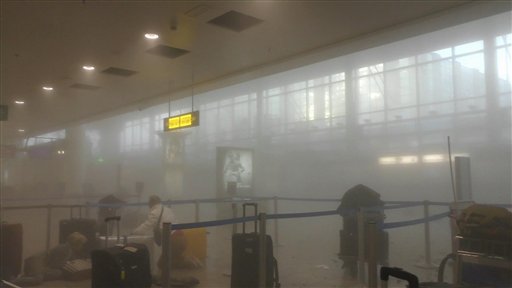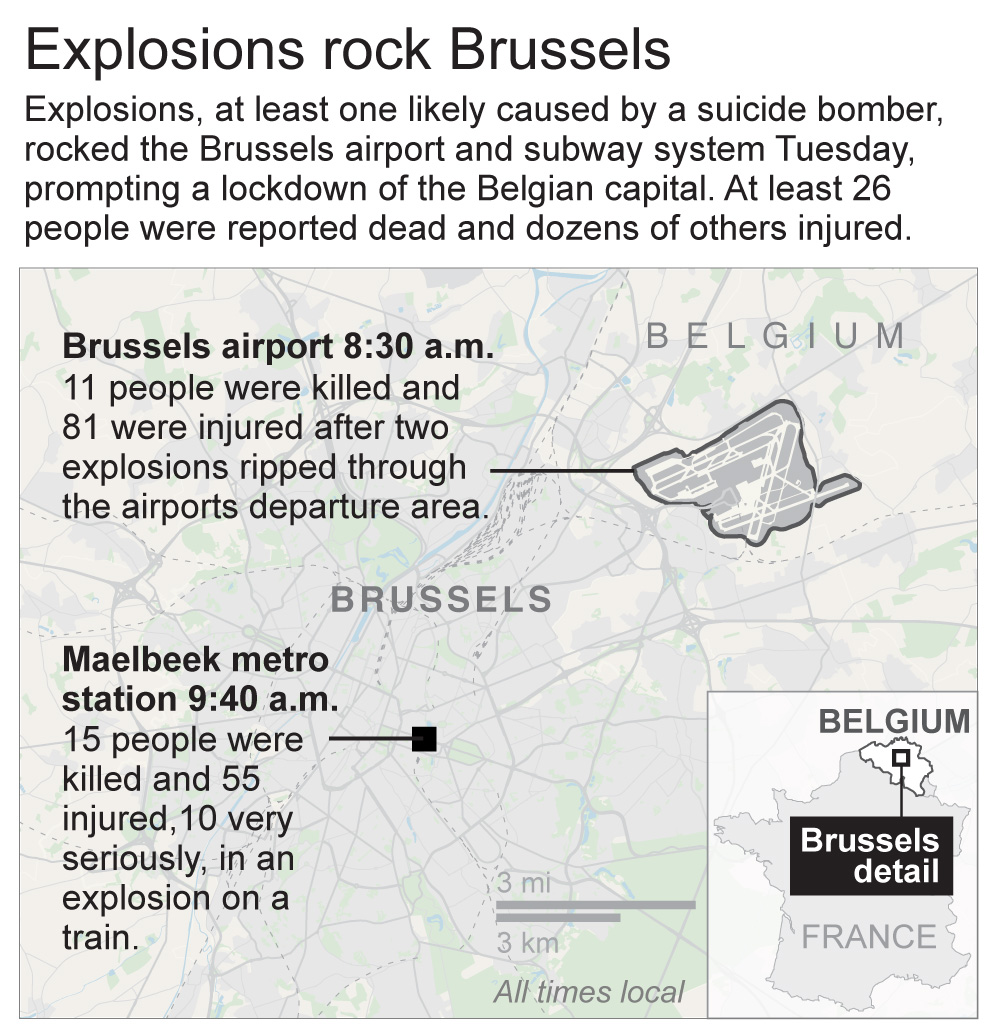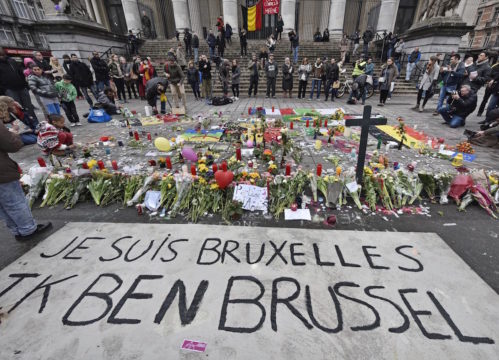For more on the latest updates on the Brussels terror attacks follow along here.
Update 4:23 p.m.: The Transportation Security Administration will send additional security to major city airports and various rail and transit stations around the U.S., according to a statement from Department of Homeland Security Secretary Jeh Johnson.
“There are also a number of other security measures we are taking that are not suitable for public disclosure,” the statement said.
Update 12:05 p.m.
The CEO of Brussels Airport said that airport will remain closed through Wednesday.
CCTV’s Olly Barratt reports from near one of the targeted sites: Maelbeek metro station.

Update 11:31 a.m.
Islamic State has claimed responsibility for the Brussels attacks, which they said were in response ‘to participating in the international coalition against’ the organization, according to Breaking News.
Bombs exploded at the Brussels airport and one of the city’s metro stations Tuesday, killing at least 34 people and wounding dozens, as a European capital was again locked down amid heightened security threats.

In this photo provided by Ralph Usbeck an unidentified traveller gets to his feet in a smoke filled terminal at Brussels Airport, in Brussels after explosions Tuesday, March 22, 2016. (Ralph Usbeck via AP)
The two airport blasts, at least one of which was blamed on a suicide bomber, left behind a chaotic scene of splattered blood in the departure lounge as windows were blown out, ceilings collapsed and travelers streamed out of the smoky building.
About an hour later, another bomb exploded on a rush-hour subway train near the European Union headquarters. Terrified passengers had to evacuate through darkened tunnels to safety.
Belgium raised its terror alert to the highest level, diverting planes and trains and ordering people to stay where they were. Airports across Europe immediately tightened security.
“We are at war,” French Prime Minister Manuel Valls said after a crisis meeting called by the French president. “We have been subjected for the last few months in Europe to acts of war.”

Associated Press map
China strongly condemned the attacks.
“Our deepest condolences to the victims, sincere sympathy to the families of the victims, and the injured,” China’s Foreign Ministry said in a statement, adding that “China is willing to step up cooperation with Belgium and the international community to face the threats and challenges posed by terrorism and safeguard world peace and security.”
President Barack Obama called Belgian Prime Minister Charles Michel to offer his condolences on behalf of the American people. Later in the morning, during remarks at the Grand Theatre of Havana, he called the attacks “outrageous.”
“This is another reminder that the world must unite,” he said.
European security officials have been bracing for a major attack for weeks, and warned that the Islamic State group was actively preparing to strike. The arrest Friday of a key suspect in the November attacks in Paris heightened those fears, as investigators said many more people were involved than originally thought, and that some are still on the loose.
There was no immediate claim of responsibility for Tuesday’s attacks, and Belgian Prime Minister Charles Michel said there was no immediate evidence linking key Paris suspect Salah Abdeslam to them. After his arrest Friday, Abdeslam told authorities he had created a new network and was planning new attacks.
Brussels Mayor Yvan Majeur said at least 20 people died and 106 injured in subway attack near EU headquarters.
Belgian media reported that 13 people were killed at the airport, where two explosions splattered blood across the departure lounge and collapsed the ceiling. The explosions hit during the busy morning rush. Smoke was seen billowing out of the terminal.
A Belgian TV station is also reporting that at least one of the bombs at the Brussels airport contained nails.
Flemish language broadcaster VTM interviewed Marc Decramer of the Gasthuisberg hospital in Leuven, who said the hospital is treating 11 people with serious injuries, three of them in critical condition. Decramer says the wounded have fractures and deep cuts caused by flying glass and nails.
Anthony Deloos, an airport worker for Swissport, which handles check-in and baggage services, said the first explosion took place near the Swissport counters where customers pay for overweight baggage. He and a colleague said the second blast hit near the Starbucks cafe.
“We heard a big explosion. It’s like when you’re in a party and suddenly your hearing goes out, from like a big noise,” Deloos said, adding that shredded paper floated through the air as a colleague told him to run.
“I jumped into a luggage chute to be safe,” he said.
Tom De Doncker, 21, check-in agent intern, was near the site of the second explosion.
“I saw a soldier pulling away a body,” he said. “It felt like I was hit too” from the concussion of the blast.
Zach Mouzoun, who arrived on a flight from Geneva about 10 minutes before the first blast, told BFM television that the second, louder explosion brought down ceilings and ruptured pipes, mixing water with victims’ blood.
“It was atrocious. The ceilings collapsed,” he said. “There was blood everywhere, injured people, bags everywhere.”
“We were walking in the debris. It was a war scene,” he said.
Near the entrance to Brussels’ Maelbeek subway station, not far from the headquarters of the European Union, rescue workers set up a makeshift medical treatment center in a pub. Dazed and shocked morning commuters streamed from the metro entrances as police tried to set up a security cordon.
“The Metro was leaving Maelbeek station for Schuman when there was a really loud explosion,” said Alexandre Brans, 32, wiping blood from his face. “It was panic everywhere. There were a lot of people in the Metro.”
Francoise Ledune, a spokeswoman for the Brussels Metro, said on BFM television there appeared to have been just one explosion on the subway in a car that was stopped at Maelbeek. Spokesman Guy Sablon said 15 were killed and 55 injured in that attack.
At the airport, passengers fled as quickly as they could.
Amateur video shown on France’s i-Tele television showed passengers including a child running with a backpack dashing out of the terminal in different directions as they tugged luggage. Another image showed a security officer patrolling inside a hall with blown-out paneling and what appeared to be ceiling insulation covering the floor.
Marc Noel, 63, was about to board a Delta flight to Atlanta, to return to his home in Raleigh, North Carolina. A Belgian native, Noel says he was in an airport shop buying automobile magazines when the first explosion occurred 50 yards away.
“People were crying, shouting, children. It was a horrible experience,” he told AP. He said his decision to shop might have saved his life. “I would probably have been in that place when the bomb went off.”
With three runways in the shape of a “Z,” the airport connects Europe’s capital to 226 destinations around the world and handled nearly 23.5 million passengers in 2015.
Passengers were led onto the tarmac and the crisis center urged people not to come to the airport.
Authorities told people in Brussels to stay where they were, bringing the city to a standstill. Airport security was also tightened in Paris, London and other European cities.
In Paris, France’s top security official said the country was immediately reinforcing security at airports, train stations and metros.
Story by the Associated Press
American Graduate School in Paris Professor Joav Toker on Brussels attacks
CCTV America’s Asieh Namdar interviewed Joav Toker, a professor at the American Graduate School in Paris about the terror attacks in Brussels.

International security expert Sajjan Gohel on Brussels attacks
CCTV America’s Mike Walter also interviewed Sajjan Gohel, international security director at the Asia-Pacific Foundation about the Brussels attacks.

University of Ottawa professor Kamran Bokhari on Brussels attacks
CCTV America’s Mike Walter also spoke with Kamran Bokhari, Middle East & South Asia specialist at University of Ottawa about the attacks.

 CGTN America
CGTN America
 A banner for the victims of the bombings at the Place de la Bourse in the center of Brussels, Wednesday, March 23, 2016. (AP Photo/Martin Meissner)
A banner for the victims of the bombings at the Place de la Bourse in the center of Brussels, Wednesday, March 23, 2016. (AP Photo/Martin Meissner)
